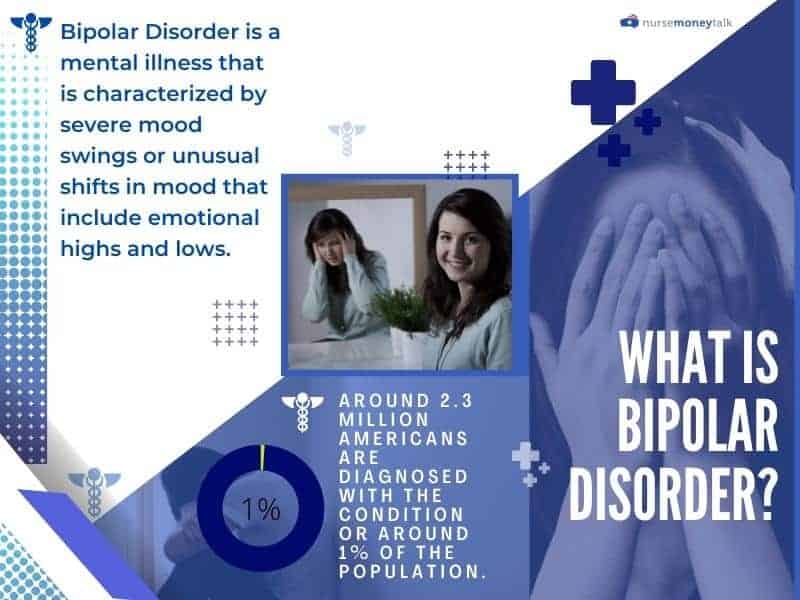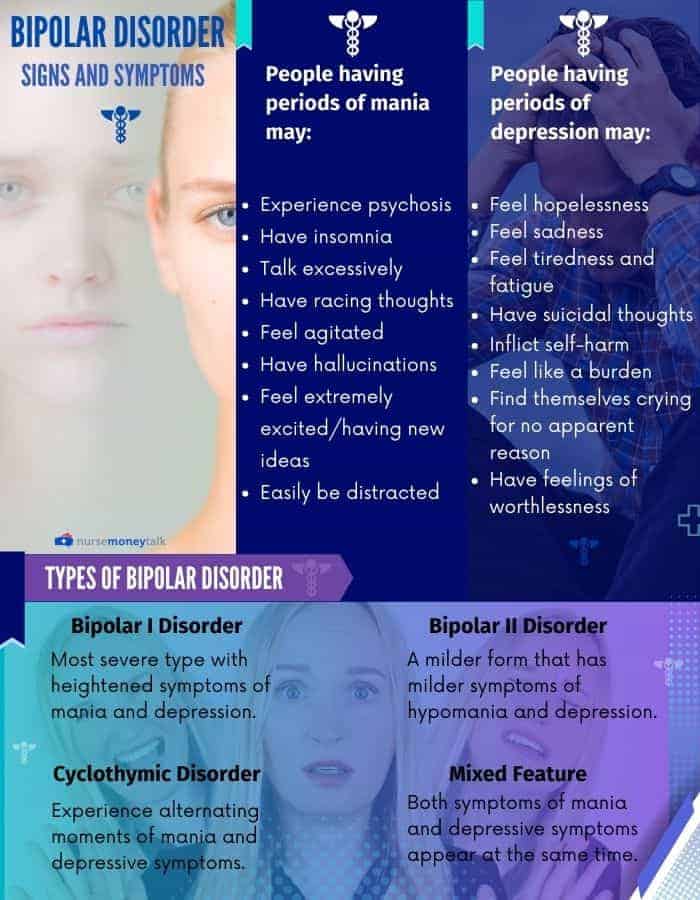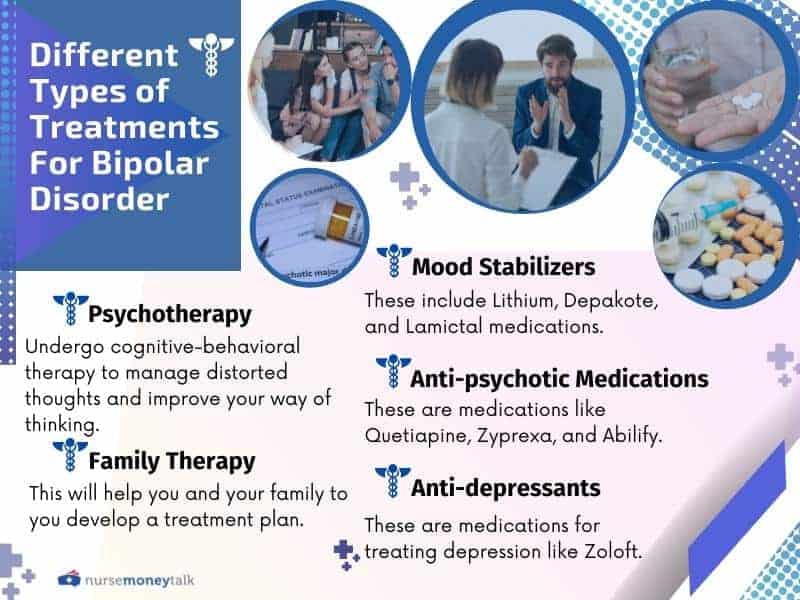Living with a mental disorder is never easy.
If you’ve been diagnosed with a mental disorder or mental illness, you might be wondering whether or not you can live a full, successful life, or do what you love.
You might be full of fear and worry.
*Disclosure: This article on can you become a nurse with bipolar disorder may contain affiliate links. If you click and make a purchase, I may receive a commission. For more info, please see my disclaimer.
Can You Become a Nurse with Bipolar Disorder?
Yes, you can become a nurse even if you have bipolar disorder. Not even severe mental illness should stop you from pursuing your dream career in nursing. By managing your symptoms, following treatment, and understanding your triggers, you can complete nursing school and have a good career.
Find Nursing Programs
Search our school database to find schools and get information on the right programs for you. (Don’t worry, it’s fast and free!)
What is Bipolar Disorder?

Bipolar disorder is not entirely uncommon.
Around 2.3 million Americans are diagnosed with the condition, or around 1% of the population.
This is a mental illness that is characterized by severe mood swings that can alternate between months.
These mood swings have periods of highs, known as mania, and severe periods of lows characterized by depression.
Mania is much more than being happy or excited. Mania affects people differently but can include symptoms such as:
- Psychosis
- Illusions of grandeur
- Insomnia
- Hyperverbal activity
- Racing thoughts
- Agitation
- Hallucinations
- Not feeling like yourself
- Being extremely excited or having new ideas
- Being easily distracted
People can cycle between periods of mania and depression. During the depressive period, people with bipolar can experience symptoms such as:
- Hopelessness
- Sadness
- Fatigue
- Not wanting to get out of bed
- Suicidal thoughts
- Self-harm
- Feeling like a burden
- Crying spells
- Feelings of worthlessness
- Loss of interest in everyday activities

In addition to these symptoms, there are also different types of bipolar disorder that coincide with the severity of someone’s illness. These include:
- Bipolar I Disorder – The most severe type of bipolar disorder with heightened symptoms of mania and depression.
- Bipolar II Disorder– A milder form of Bipolar I Disorder, where people experience milder symptoms of hypomania and depression.
- Cyclothymic disorder – A type of bipolar disorder with fleeting moments of mania and depressive symptoms alternating between one another.
- Mixed Feature – A type of bipolar disorder that can cause someone to have both symptoms of mania and depressive symptoms at the same time.
Managing Symptoms of Bipolar Disorder

Whether you have Bipolar I or Bipolar II disorder, your doctor or psychiatrist will determine the best course of treatment for your mental illness.
These treatments are effective in helping manage your mood, preventing bipolar episodes from occurring, and helping improve your outlook.
All of these treatments will help you whether you’re a nursing student, working already as a nurse, or simply want help to treat your mental illness.
The different types of treatments for bipolar disorder include:
- Psychotherapy: such as cognitive-behavioral therapy to help you manage distorted thoughts and improve your way of thinking.
- Family therapy: to help you and your family develop a treatment plan for your bipolar episodes.
- Medications: such as mood stabilizers. These include the medications like Lithium, Depakote, and Lamictal.
- You may also get medication to treat depression. These could be antidepressants like Zoloft.
- You may also get anti-psychotic medications such as Quetiapine, Zyprexa, and Abilify.
It’s important to take your medication as prescribed by your psychiatrist or doctor.
Even if you “feel better,” never stop taking your medication suddenly.
If you’re having a hard time remembering to take your medication during nursing school or working, set an alarm on your phone or consider setting up a pillbox to take with you.
If you feel you need more therapy, this is also a good idea to bring up with your doctor or psychiatrist.
Nowadays, you can easily obtain more therapy through telehealth or virtual appointments.
This makes it easier for nursing students to attend therapy sessions and not have to waste time commuting back and forth to their clinician’s office.
Find Nursing Programs
Search our school database to find schools and get information on the right programs for you. (Don’t worry, it’s fast and free!)
Reducing the Risk of Bipolar Episodes
During nursing school and working as a nurse, the rates of stress are incredibly high. In fact, around 60% of nurses report feelings of stress, anxiety and being emotionally exhausted.
As someone living with bipolar disorder, this is a fact you will have to consider, as stress is one of the biggest causes of triggering a bipolar episode.
Other causes can include:
- Stressful outside life events
- Childbirth
- Changes in medication
- Changes in the seasons, especially if you have a co-occurring seasonal affective disorder
Managing your medications, managing stress, and avoiding the use of drugs and alcohol can greatly reduce your risk of a bipolar episode occurring.
However, even if you do end up with a bipolar episode, know that the average length of stay for a bipolar episode was around 16 days.
This gives professionals enough time to stabilize you physically, mentally, and emotionally and give you the chance to return to work.
In addition, it is illegal for employers to fire you based on a bipolar episode or another episode of physical or mental illness.
Key Takeaways
Although bipolar disorder can be difficult to live with, managing your symptoms and talking to your doctor about your stressors can help reduce the risk of bipolar episodes.
You can successfully complete nursing school, have a career as a nurse, and even help others like you in the medical field!
If you’re ready to make the jump and pursue a career as an RN, check out our job board or school board and make the transition today.
Find Nursing Programs
Search our school database to find schools and get information on the right programs for you. (Don’t worry, it’s fast and free!)
Have You Read These Yet?
- Can You Become a Nurse with One Eye?
- Can You Become a Nurse with Schizophrenia?
- Can You Be a Nurse with a Felony?
- Can You Become a Nurse with Depression?

